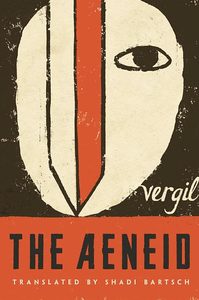The Aeneid
by Vergil

A melancholic soul sets its course with the compass drawn to longing. For me and for Vergil’s refugee Aeneas, that compass points to “home.”
The location of home should be easy. For Aeneas, a prince of Troy, the besieged city was his home and sanctuary. Surrounded by his family and with a clear mission to stave off Agamemnon’s invasion, Aeneas’ home only seemed secure. He is thrown to the mercy of the winds when his home is betrayed, his house destroyed, and even his youngest relatives exterminated in a night of fire. What remains is nothing more than a promise, a vague and veiled divine assurance of a grand cosmic legacy that pushes him onward through disaster, monsters, and war.
The location of home should be certain. For me, a rural child, home existed somewhere on corn-lined roads reading by the dying daylight. Isolated from friends and bombarded by the combative collapse of family, my house could not pretend to be home. Eventually I hid from pugnacious parents, beguiling bullies, and faithless friends in seas of ink, clinging to a barque of paper as my social order descended to Hobbes’ state of nature. What remained in me was a diehard dedication to the belief that integrity shall someday prevail over buffeting storms and a hope of pulling into port.
My auguries pointed to Carleton. It was not just another strife-filled stop along an odyssey of assorted islands. Nor was it fully-furnished home ready for move-in. Like Aeneas, I arrived to find both allies who promised the fulfillment of that prophesied home and adversaries unwilling to welcome an outsider. The glorious heroics of devoting every talent and every effort of strength transformed me and transcended the place.
Home grows like the people within it, not a location but a balance. Vergil demarcated my academic life, dominant at the start, middle, and very end of my Carleton career. His Aeneid provided the centerpiece of three courses with unceasing richness. Each class adopted a different angle, and each mentor taught a different man. First was a Classical war hero, a dashing demigod war machine. Second was a refugee, desperately flung from place to place as an unwilling wanderer. Third came a sensitive and grieving son seeking in turn to be a better father. Through the courses I found myself changing like the hero; we were one person in different stages of the sphinx’s maturing man. Aeneas is not just ‘the crying hero’ but one of the only hero figures to know the cost of risk. He is transformed, reborn from fire, from hardship, from persecution. His courage lies embedded in grief, ready to risk his people and last relative for a little patch of long-promised Italy to call home. He speaks sympathetically to those who will listen and overcomes the hardships imposed by those who will not. In a war of words where my values and beliefs borne of pain and practice came under constant fire in class, I argued for a place that could be home. With the support of faculty allies, I fought for peace. I befriended detractors. I followed the promise, a divine assurance that another refugee can cultivate a strange place and make the place, and the people, home.
Home, then, is what you make it. The archetypal hero always leaves or loses home. What home means becomes part of the journey, that process of forming a person ready to encounter a hostile world and transform it. The hero changes, growing wiser and more resilient. The place that would be home changes, a concept of being comfortable with ever more people and ways of life. The idea of home itself changes, allowing the hero to grow enough to face the trials of the world and enough to open the heart to include more people. When a hero builds a roof big enough to bridge the divides that separate people, there is home.
Carleton, like any house, is never complete. But it became my home, a home I continue to build and patch after every storm we face, a home more refugees and more heroes deserve to find and build.